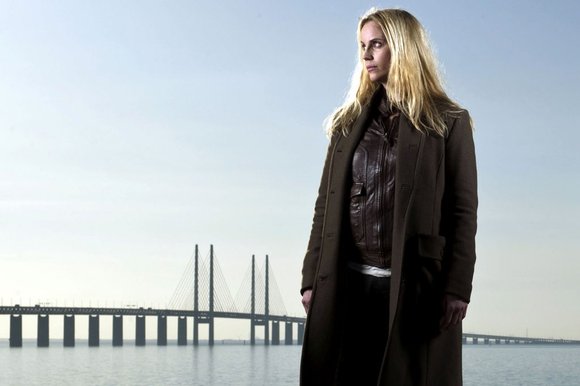Having never been a huge fan of crime or murder-mystery series’ on TV, I’ve recently found myself addicted to a certain number of them, to the point where I’ve binge-watched them over a number of weeks, leaving my LoveFilm movies to one side as I complete each season. It started with Danish crime series The Bridge, and my girl-crush on lead character Saga Norén, then Sarah Lund in another Scandi-drama, The Killing, and now Carrie Mathison in Homeland. (I’m probably soon to start obsessing over Stella Gibson in The Fall or Gro Grønnegaard in The Legacy.)
I’ve always preferred human stories over complicated whodunnit plotlines so I’ve followed the stories of these women as they’ve led missions to solve crimes and track down villains, not really caring about the superficial plotline, but definitely caring about what happens to them and why they’re doing what they do.
A number of identifying characteristics binds them all and I’m finding it fascinating as to why this is a trend in crime dramas – the rise of the brilliant, yet unstable, often mentally challenged, highly independent professional woman who doesn’t give a toss about family or having children. To all intents and purposes, this is the new version of the maverick, swaggering, ‘fuck you’ trope of the ’70s and ’80s crime dramas, epitomised in male-led cop shows like Cracker or The Sweeney and parodied by Gene Hunt in Life on Mars.
These women walk into bars and pick up guys, they drink too much and they neglect their progeny. They’re brilliant at their jobs but they have trouble interacting socially and are prone to say what they think, even if it’s inappropriate. They’re sometimes highly autistic or bipolar, needing medication to manage their mental state, along with wine. They can’t be bothered wearing makeup or man-pleasing clothes – they simply get clean t-shirts out of their desks or pull on frumpy jumpers and badly fitting trouser suits instead. Who gives a f*ck about appearance when there’s a job to be done?!
I’ve been thinking a lot about this development, and wondering if it’s a bad thing that these brilliant women are being portrayed as child-resistant ‘unnaturals’. Are we meant to celebrate their inhabiting of the lone-wolf space, previously taken up by family-avoiding male detectives, or are we criticising their refuting of domestic bliss for the joy of job satisfaction? The trend has its roots in earlier cop dramas like Prime Suspect and Cagney and Lacey – Jane Tennison and Chris Cagney were allowed to exist outside the domestic space but it was one they at least tried to access. These new women are not even considering it – if anything, human relationships are secondary to their professional ones in a way that has stereotypically been associated with men for decades.
If we’re meant to be critical of these women, then I’m not feeling it. I’m watching these shows precisely because they outline the concept of female independence so clearly. The recent crop of them shows that there is a huge audience fascination with these ladies, and it can’t just be women watching them. I have to admit that my first thought on watching The Bridge was, “typical – to be a successful, non-familial woman in a male-dominated space on TV, you have to be somewhere high up on the autistic spectrum, and your lack of maternal instinct viewed as nothing short of freakish.” Then, as the number of these high-functioning women appearing on my TV screen grew, I started to think that this trend is nothing short of a revolution in female roles both on- and off-screen. Yes, the characters are flawed in ways that fascinate us, but we don’t judge them for non-conformity.
What’s most interesting is that when Skyler White first graced our screens in Breaking Bad, pregnant and desperately trying to hold together a picture of domestic bliss and familial normality, social media exploded in direct criticism of her actions, as though she was somehow spoiling her husband’s maverick crystal-meth-making fun. Even the actress that played her was vilified for the part she played in trying to keep her family together, trying to make her husband conform.
So bring on Stella and Gro because I can’t get enough of these indie women. The plotlines of these series are just a sideshow to the real story – women are dominating our screens in ways we’ve never seen before and I love it. This winter I’ll be swishing around in a military greatcoat (which I’ve had for years, actually) and DM boots, pretending I’m Saga, solving crimes in Denmark, eschewing makeup and letting my hair dry naturally as I stride into the office.
I might stop short of changing my t-shirt in the office in front of everyone, though.
I don’t think we’re ready for that just yet.
